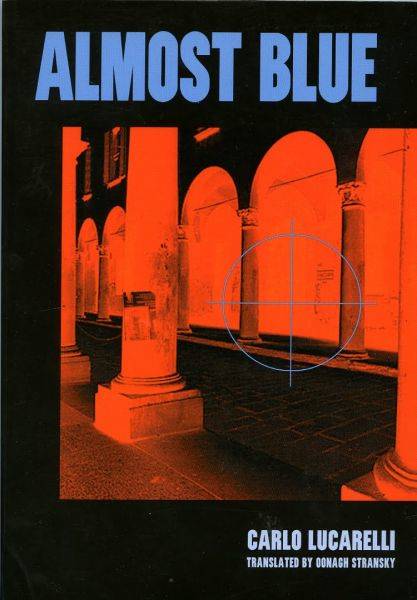BOOKS - Carlo Lucarelli's Almost Blue
Carlo Lucarelli (b. 1960, Parma) is an author, director, screenwriter, journalist, and host of the true crime show Lucarelli racconta. Celebrated for his noir sensibility and gritty portrayal of Bologna, Lucarelli is a founding member of a distinguished group of mystery novelists from the city known as “Gruppo 13.” He is perhaps best known for his protagonists Inspector De Luca and Inspector Coliandro, both of whom are featured in popular RAI television series.
Another of Lucarelli’s successful protagonists is Inspector Grazia Negro, who has appeared in five mysteries to date. In Almost Blue (Einuadi, 1997), the second novel in the Inspector Negro series, Grazia is on the trail of the Iguana, a ruthless psychopath who massacres university students and then assumes their identities. Luckily for Grazia, there is a witness named Simone. But because Simone is blind and associates voices with colors he’s never seen, he can tell her only that the Iguana’s voice is “green.” As Grazia struggles to make sense of the crimes, the Iguana becomes aware that she and Simone are tracking him. And he knows exactly where to find them.
Because Almost Blue is set in Bologna, it contains glimpses of the regional language spoken in Emilia Romagna and the surrounding area. Other interesting linguistic features of the novel include slang terms and neologisms typical of neostandard Italian, as well as jargon specific to technology and police work.
REGIONAL ITALIAN
maraglio (Ital. cafone; Eng. literally hick, meaning loser) (Bolognese)
Senti maraglio, noi ci vediamo questa sera al Teatro Alternativo.
(Listen, loser, everyone’s getting together tonight at the Teatro Alternativo.)
DIALECT
xe (Ital. c’è; Eng. there is) (Venetan)
ghe (Ital. che; Eng. that)
Lo sapevi che la macchina me serve perché xe lo sciopero dei treni e allora io come ghe torno a ca’?
(Lo sapevi che la macchina mi serve perché c’è lo sciopero dei treni a allora io come che torno a casa?
You knew that I needed the car because there’s a train strike. So how is it that I’m going to get home?)
’ndo’ (Ital. dove; Eng. where) (Romanesco)
La macchina ’ndo’ stà?
(Dove sta la macchina?
Where is the car?)
NEOLOGISM
ucciesse (the initials U.C.S., or U.S.C. in English, made into a word)
“Sono arrivati gli americani,” disse forte. “Ecco quelli dell’ucciesse.”
(“The Americans have landed,” he said loudly. “They’re from U.S.C.”)
COMPOUND NOUNS
ventiquattrore (Eng. overnight bag)
Le dita di Vittorio si muovevano rapide nella ventiquattrore aperta.
(Vittorio’s fingers moved quickly in the open overnight bag.)
salvaschermo (Eng. literally, it saves screens, as in screensaver)
Sullo schermo del terminale il salvaschermo del programma disegnava la scritta POLIZIA DI STATO, a caratteri cubitali.
(On the computer, the screensaver read STATE POLICE in large letters.)
FOREIGNISM
phonati (Eng. blow-dried; from the German föhn, which refers to a warm wind)
Vittorio era sempre il solito, abbronzato il giusto, elegante il giusto, con i capelli lunghi phonati all’indietro, il sorriso franco e cordiale e la mano tesa.
(Vittorio looked the same as always: the perfect tan, the perfect elegance, with his long hair blow-dried back, a sincere and cordial smile, and his hand extended in greeting.)
SLANG
schizzatissimo (Ital. schizzato + -issmo; Eng. literally someone who is extremely bizarre or out of it, a total freak)
Oh, Tasso… non è un fonico, è uno schizzatissimo che dice di aver del gran fumo.
(Hey, Tasso… He’s not a soundman, he’s a total freak who says he has some good grass.)
ITALIAN PHONETIC ALPHABET
Fammi subito un terminale su questa targa… A come Ancona, D come Domodossola…
(Run a quick check on this license plate… A like Ancona, D like Domodossola…)
Concluding Remarks: Almost Blue is a true noir thriller. The Iguana is a sick, twisted individual that will leave you completely in the dark (and looking over your shoulder) as you try to anticipate his next move. Speaking of twists, there are a few at the end that, like Grazia and Simone, you won’t see coming.
Note: Lucarelli named almost Almost Blue after the Elvis Costello song. The Italian translations of lyrics from the song, as well as from ACDC’s “Hell’s Bells” and Nine Inch Nails’ “Reptile,” make for an entertaining read.
In Translation: Almost Blue was translated into English by Oonagh Stransky, who won the Booksense 76 award for the translation.
On Film: In 2000, Almost Blue was made into a film directed by Alex Infascelli. Watch this terrifying trailer.
On the Internet: For more information about Carlo Lucarelli and his work, visit his website. There you’ll find lots of fun details about the author, including the book that changed his life, his favorite pasta, and his ten rules for writing a mystery novel.





































i-Italy
Facebook
Google+
This work may not be reproduced, in whole or in part, without prior written permission.
Questo lavoro non può essere riprodotto, in tutto o in parte, senza permesso scritto.